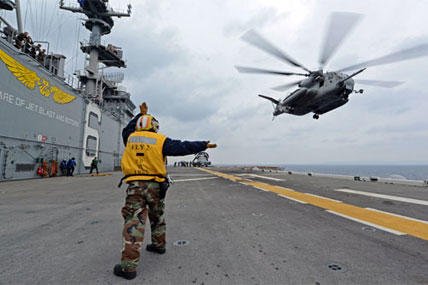U.S. commanders in the Pacific, Africa and Central Command told lawmakers Wednesday that they were concerned that spending reductions proposed in the 2015 defense budget would cut down on military readiness.
The commanders appeared before the House Armed Services Committee where law makers focused their questions on how the Pentagon's budget proposal may change the way units under their command operate. Lawmakers expressed concern that cuts in the $496 billion proposal might reduce the regional commands' ability to respond to threats.
Adm. Samuel Locklear, Commander, U.S. Pacific Command, said the ability of forward positioned crisis response teams has been challenged by fiscal constraints. Calling the readiness levels unacceptable, Locklear said remaining forces have often stepped in to address shortfalls.
"Services have had to move readiness from the rest of the global force and push it in our direction so we can keep those forces who might have to do something quickly ready. They have done that but it was at significant expense to the follow on force," Locklear told lawmakers.
Follow on forces are key to supporting the crisis response forces who might, in theory, need to respond quickly if there is a crisis on the Korean peninsula should a U.S. ally be threatened.
Locklear added that while the Pacific makes up about 52 percent of the world, only 17 percent of the area is land mass, something which underscores the need for aviation and maritime assets. He expressed concern about the diminished readiness and availability of the joint force.
"The ability of the services to provide the type of air coverage and maritime coverage we have needed in this part of the world for crisis response has not been available to the level that I would consider acceptable risk," Locklear said.
CentCom commander, Gen. Lloyd Austin, who oversees the current drawdown in Afghanistan, expressed concern about whether enough forces would be trained and available.
"My concern with a shrinking budget would be whether or not the services would have what they need to provide trained and ready forces in a timely fashion," Austin told lawmakers.
Austin also expressed concern about whether war-damaged equipment would be repaired and refurbished -- a huge issue in light of recent ground wars.
"I would be further concerned about an ability to refurbish equipment that we've used for the last 13 years," he said.
He added that he is also worried about whether there is enough money to provide what he called critical enablers, those technologies such as intelligence, reconnaissance and surveillance assets.
Gen. David Rodriguez, Commander, U.S. Africa Command, indicated that he is concerned about funding for intelligence personnel in his region.
He said the many of the intelligence personnel in the Africom region have been funded by supplemental -- or overseas contingency operations (OCO) -- dollars, making budgeting for them less stable and more challenging. The President's 2015 budget request asks for $79.4 billion in OCO funding but specifies that the figure is just a placeholder prior to submission of a final request.
Rodriquez added that money is needed to ensure safety and mobility of missions underway in the region. He expressed concern regarding readiness for helicopters and fixed wing assets.
"We also have a significant amount of activity going on throughout the area of responsibility in very, very small groups, so I worry about medical evacuation and personnel recovery and mobility assets, some of which were challenged during the past year because of sequestration," he added.
Rep. Howard McKeon, R-Calif., Chairman of the House Armed Service Committee, said he was worried the problems could be even more severe because the Pentagon's budget proposal didn't account for sequestration.
"The problem that we have is I think we've cut too much out of defense and I think most of the members of this committee agree -- and the budget that they presented to us didn't take into account sequestration," McKeon said.
He expressed concerns about cuts to budget and personnel, explaining that the 2015 budget proposal will bring the Army to its lowest level since World War II.
"If sequestration kicks back in at the end of this budget, the troop level would have to go down to 420,000," he added.
Ranking member Rep. Adam Smith, D-Wash., took a different view, saying Congress would need to reconcile its need to reduce spending with its complaints and concerns about budget reductions.
In particular, Smith made reference to the Air Force decision to save money by retiring the A-10 warthog airplane and the Navy move to save billions by laying up half of its cruiser fleet. In each of these instances, money was then made available for other military priorities, Smith said.
"If we don't do a base closure…if we don't make some savings in personnel…if we don't retire the A-10s or mothball 11 cruiser ships then we have billions upon billions to make up somewhere else in the budget," Smith said.
-- Kris Osborn can be reached at kris.osborn@monster.com




























